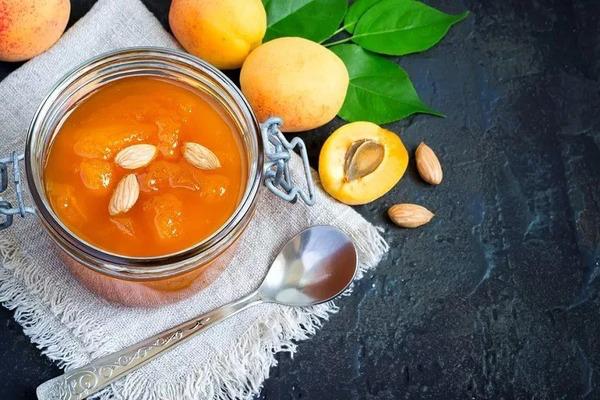Content
- 1 What is this fruit
- 2 Chemical composition of apricots
- 3 Calorie content of fresh apricots
- 4 Useful properties of apricots
- 5 The benefits of apricots for women
- 6 Why apricots are useful for men
- 7 Apricots during pregnancy and breastfeeding
- 8 At what age can apricots be given to children
- 9 Is it possible to eat apricots while losing weight
- 10 The use of apricot in medicine
- 11 Features of the use of apricot for some diseases
- 12 Are there any benefits in green apricots
- 13 Useful properties of apricot tree bark
- 14 Benefits and uses of apricot leaves
- 15 Why apricot juice is useful
- 16 Apricot face mask
- 17 How to eat apricots
- 18 Why apricot jam is useful
- 19 Which is healthier: apricot or peach
- 20 Harm of apricots and contraindications
- 21 How to choose and store apricots
- 22 Conclusion
In the summer, even more fruits and vegetables appear on the shelves. Apricot takes a special place among them. This sunny fruit can be seen on the table of every family, because it has an amazing taste. In addition to its taste, the fruits of the apricot tree have a beneficial effect on health. However, the fruit has some contraindications for use. The benefits and harms of apricots are actively discussed by experts. One thing has been proven for sure - it is loved and bought all over the world!
What is this fruit
Apricot is the stone fruit of the apricot tree. Appearance - oval, bright orange color, rough skin. This bright fruit grows in Russia, Armenia, European countries and some others. However, the homeland is considered to be the territory of China. It has been cultivated for over 2000 years, and a large number of new species have been developed over the past decade.
Chemical composition of apricots
The chemical composition depends on several factors. This is influenced by storage conditions, degree of maturity. The fruit is 86% water. It is rich in sugars: sucrose predominates, slightly less fructose. Contains acids: citric, malic, coffee.
Apricot kernel rich in minerals and hydrocyanic acid. The composition also contains fatty oil, on the basis of which cosmetics are made. The largest amount of vitamins and minerals is hidden in the pulp.
What vitamins are in apricots
The fruits of the apricot tree contain a lot of vitamins. Vitamin C is deservedly in the first place. Unfortunately, under the influence of the sun and during heat treatment, it begins to break down. For example, dried apricots contain 10 times less of this vitamin. That is why apricots are worth eating fresh.
The fruit is rich in vitamins A, E. It contains fiber. It has the most useful amino acids: arginine and glycine. The fruit has an impressive amount of minerals: potassium, phosphorus, magnesium.
Calorie content of fresh apricots
The calorie content of apricot per 100 grams is 44 kcal. The fruit weighs on average 30 g. It turns out that the calorie content of 1 apricot is 13 kcal. This is a great option for a light snack for those who are looking after their figure and health.
The nutritional value:
- proteins - 0.9 g;
- fats - 0.1 g;
- carbohydrates - 9 g.
Due to the large amount of carbohydrates and sugar, the product is not recommended for consumption in the evening. It is better to leave this treat for the morning or afternoon.
Useful properties of apricots
It is difficult to list all the beneficial properties of apricot. This summer fruit is a real storehouse of vitamins and minerals.

The fruits will be useful for people suffering from gastrointestinal problems. After all, the fruit is rich in fiber, which has a laxative effect. Thanks to its high phosphorus and calcium content, the product is good for bones. It also increases the level of hemoglobin in the blood, has a beneficial effect on memory and brain activity. Very often, doctors recommend apricot as a remedy for edema, as it promotes the elimination of salts. Vitamin A in the composition helps to improve vision.
The benefits of apricots for women
Fresh fruit contains iodine salts, which have a positive effect on the thyroid gland. Women know how big a role she plays in the production of female hormones. Consuming apricots on a regular basis will help support women's health and beauty.
Why apricots are useful for men
The fruit of the apricot tree is able to solve some male problems. They increase the potency in men, this is due to the flow of blood to the genital area after eating the fruit.
Older men are at risk and quite often have diseases associated with the cardiovascular system. The constant use of this product can be a good prevention of heart disease.
Apricots during pregnancy and breastfeeding
Women in the position carefully choose foods for their diet. Fruits are a storehouse of useful substances, so you cannot neglect their use.
Apricots are recommended for pregnancy in the third trimester. Indeed, very often in women during this period, anemia is observed, iron helps to fight it. Vitamin C will strengthen the immune system and prevent colds from attacking the body. Potassium regulates water balance, and phosphorus "builds" the baby's skeleton.
Young mothers ask themselves the question "Is it possible to breastfeed apricots?" Doctors say that a nursing mother can eat apricots. However, there are some exceptions to keep in mind. For example, an individual intolerance to a fruit by a mother or baby.

At what age can apricots be given to children
Experts unanimously say that it is necessary to introduce this product into complementary foods after six months and later. Fresh fruit can be given to children after 10 months.
Each organism is unique, so you need to consult a pediatrician before use. Allergy to apricots in a child is a common occurrence.
Is it possible to eat apricots while losing weight
With a sufficiently low calorie content, fruits have a lot of carbohydrates and sugar. That is why apricots should be eaten very carefully when dieting. Nutritionists recommend consuming no more than 150 grams of fruit per day. However, you should not completely eliminate the product from your diet. After all, the composition is enriched with a whole complex of vitamins that the body needs on a diet.
The use of apricot in medicine
In ancient times, the fruit was dried and used as a remedy to eliminate bad breath. Times have changed, after research, the fruit began to be used to treat a host of other diseases.
Now the fruits are recommended for anemia, arrhythmias. And also used for constipation, since apricots have a laxative and diuretic effect. Some experts even insist on using apricots for extreme fevers and coughs.
Recipes
Traditional medicine offers a huge number of recipes with the fruits of the apricot tree:
- For constipation, you can prepare a gentle laxative - apricot compote. It is drunk three times a day after meals.
- If you have a wet cough, you should use apricot pulp puree.
- In case of vitamin deficiency, a spoonful of vegetable oil should be added to the apricot juice. This drink is able to saturate the body with a sufficient amount of vitamins, make up for the lack of vitamin A.
Features of the use of apricot for some diseases
The medicinal properties of apricots cannot be denied. But, like any product, it has features of use. It can be extremely useful for some people, and harm for others. Before eating it, people with various diseases should think about it. For example, those who suffer from diabetes mellitus, pancreatitis, gastritis, stomach ulcers, dropsy.
With diabetes mellitus
The disease limits a person's choice of foods for their diet. Diabetics need to be careful when eating apricots. Doctors recommend not to abuse the fruit, eat no more than 4 pieces a day.
Lovers of treats can try another way. Apricots for type 2 diabetes are advised to be replaced with dried apricots. It contains less sugar.
With pancreatitis
The fruit of the apricot tree can be harmful for pancreatitis. Due to the laxative effect, they are able to disrupt the stool, which, in an aggravated form, is quite sensitive. Better to postpone the purchase of fruit until the moment when the disease subsides. It is not recommended to eat apricots on an empty stomach.
With gastritis and stomach ulcers
Apricots for gastritis with high acidity are completely prohibited. They can sometimes be eaten if the acidity of the gastric juice is not increased. In any case, you must first consult with a specialist.
With an exacerbation of peptic ulcer disease, you cannot eat apricots. During the period of remission, you should not consume more than 5 pieces per day. Fruit should be included in the diet as an independent meal, eaten separately from protein meals.
With dropsy
Experts recommend the fruits of the apricot tree for dropsy. They are able to cleanse the body of toxins and toxins. This is achieved through a diuretic and laxative effect. However, don't get carried away and eat too much.
Are there any benefits in green apricots
Unripe fruits can be harmful to health. First, green apricots are devoid of beneficial properties and have no positive effect on the body. Second, they can be harmful to the intestines and gastrointestinal tract. In some cases, the fruit causes diarrhea.
Useful properties of apricot tree bark

The bark of the apricot tree is unique. Even in ancient China, healers used it for treatment. Then and now a decoction is cooked from the bark, which contains a substance similar to piracetam. The broth helps the heart and brain, restores strength.
Benefits and uses of apricot leaves
Apricot leaves are a cure for many diseases. They are able to cleanse the body of toxins. People whose profession is associated with harmful production can safely drink 1 glass of decoction from the leaves daily. The broth also helps get rid of worms.
For bruises and hematomas, apply a compress from the leaves of an apricot tree. Beforehand, it is worth wrinkling them a little. The finished compress is left overnight.
The leaves of the tree will be great helpers for stomatitis. Experts recommend chewing them twice a day.
Why apricot juice is useful
Apricot juice contains carotene, organic acids, inulin, fiber, potassium, iodine. In terms of carotene content, the fruit ranks first among the rest grown in Russia. Pectin fights against cholesterol plaques on blood vessels and removes toxins from the body. Vitamin A slows down the aging process, is good for teeth and bones. For the prevention of various diseases, you must drink 1 cup of juice a day.
Apricot face mask
Apricot is used in cosmetology. The stores are overflowing with beauty products containing various creams, scrubs, masks with this sunny fruit. Ripe fruits are known for their refreshing, tonic and emollient properties. This is due to the high content of vitamins A and E, essential trace elements.
Many people know that effective face masks can be prepared right at home.Those with dry skin will love the nourishing mask. To prepare it, just mix a spoonful of sour cream and a spoonful of fruit puree. After 20 minutes, wash off with cool water.
A crushed apricot mask is suitable for all skin types. It is a wonderful product that evens and refreshes the skin.
A popular scrub with apricot pits. However, it will be quite difficult to make it. It is necessary to grind the kernels of apricot kernels, add a tablespoon of honey and oatmeal. Apply the resulting consistency to the face, massage thoroughly for 3 minutes.
How to eat apricots
According to the rules of decency, apricot is eaten as follows:
- you need to hold the fruit with the stalk down;
- you need to bite closer to the bone;
- after the bone is visible, it is pulled out with the fingers of the other hand.
Such "instruction" is dictated by etiquette.

However, some people choose to eat the product differently. At home, you can cut the fruit in half and remove the bone. Transfer the apricot halves to a plate and enjoy the taste.
The sun fruit is not only eaten fresh. They make jam with it, add it to salads and main courses, make desserts. The dried version is especially popular - dried apricots.
Why apricot jam is useful
Almost 80% of the nutrients are retained when making jam. That is why it is very convenient to prepare apricot jam in the summer, when the fruit is sold in every supermarket. In winter, a jar of useful delicacies will save you from colds, malaise. It will solve problems related to the gastrointestinal tract and the cardiovascular system. Apricot jam is recommended for people with cancer.

Which is healthier: apricot or peach
Many children confuse the appearance of apricot and peach. These vibrant fruits are different from each other, but both are very healthy. Peach contains more zinc and magnesium. However, apricot is enriched with potassium and vitamin A. One cannot say that one fruit is healthier than another. Verdict: They are both useful, but each in its own way.
Harm of apricots and contraindications
Despite the benefits of this fruit, it can be really harmful. The bone contains amygdalin, a substance dangerous to the human body. Therefore, you can only eat the kernels that are inside the bone. They are deprived of amygdalin.
Stomach problems can affect even an absolutely healthy person with excessive consumption of the product. Apricot should be eaten wisely and know all the contraindications.
How to choose and store apricots
When choosing a fruit, in no case should you buy green fruits. Ripe apricot has a uniform orange color, small specks of a darker color are allowed. But too dark specks may be a sign that the apricot has already begun to deteriorate. The fruit should be firm, the skin should not be damaged. The aroma of the fresh fruit is sweet, fruity.
Unfortunately, apricot retains its appetizing appearance less than other fruits. It should not be left on the kitchen table, it is better to put it in the refrigerator. It can be stored there for about 5 days. As soon as dark spots appear on the fruit, it must be thrown out.
Conclusion
The benefits and harms of apricots have been proven.Having familiarized yourself with all the contraindications and peculiarities of use, you can save yourself from negative consequences. The competent inclusion of this product in the diet will improve mood, give vigor and strength, and correct health problems.
See also:
Banana chips: benefits and harms, recipes with photos
How to get rid of the smell of fish in the refrigerator: how to remove a rotten smell, folk methods


